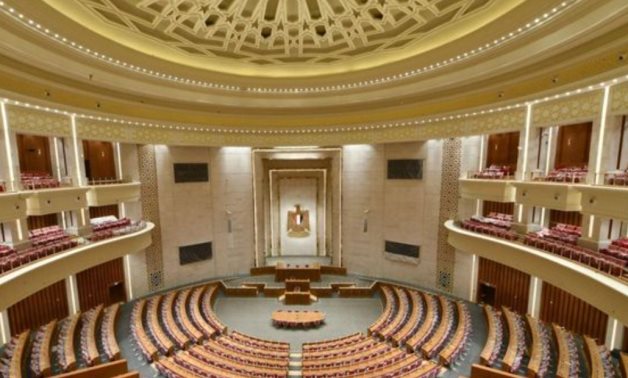This post discusses the house of representative of Egypt which is also the lower house, the parliamentary and non-parliamentary era and organization of the house.
LOWER HOUSE
Parliamentary life began in Egypt as early as 1866, and since then several forms of national assemblies have been formed, dismantled, and amended to reach the present-day form. Since 1866, Egypt witnessed seven parliamentary systems whose legislative and oversight competencies varied and reflected the history of the Egyptian people’s struggle to establish a society based on democracy and freedom. For more than 135 years of parliamentary history, Egypt witnessed 32 Parliaments whose members ranged between 75 and 458 who contributed to writing Egypt’s modern political social, economic, and cultural history. According to the present-day constitution, the Parliament consists only of the House of Representatives (“Maǧlis an-Nowwab”), a 596-member lower house.
NON PARLIAMENTRY ERA
Egypt was without a parliament for three years. The parliament was dissolved in June 2012. On 8 July 2012, President Mohamed Morsi said he would override the edict that had dissolved the country’s elected lawmakers, but that was followed by his deposition.Elections for parliament were held from 17 October 2015 to 2 December 2015.
PARLIAMENT OF EGYPT
The Parliament of Egypt is the bicameral legislature of the Arab Republic of Egypt. It is composed of an upper house (the Senate) and a lower house (the House of Representatives).
The Parliament is located in Cairo, Egypt’s capital. Under the country’s 2014 constitution, as the legislative branch of the Egyptian state the Parliament enacted laws, approved the general policy of the State, the general plan for economic and social development and the general budget of the State, supervised the work of the government, and had the power to vote to impeach the president of the Republic, or replace the government and its prime minister by a vote of no-confidence.
The parliament is made up of 596 seats, with 448 seats elected through the individual candidacy system, 120 elected through winner-take-all party lists (with quotas for youth, women, Christians, and workers) and 28 selected by the president. It is the fifth-largest legislative chamber in the world behind the National People’s Congress and the largest parliamentary body in the Arab world.
The 2014 constitution that was passed in the 2014 constitutional referendum has put into place the following rules: the House that is elected following the ratification of the constitution must have at least 450 members. In addition, prospective members must be Egyptian, must be at least 25 years old and must hold an education certificate. Also, the president can appoint, at the most, five percent of the members in the chamber.
The House sits for a five-year term but can be dissolved earlier by the president. All seats are voted on in each election. The House of Representatives members are elected by absolute majority of legitimate votes cast.
The House may demand the resignation of the cabinet by adopting a motion of censure. For this reason, the Prime Minister of Egypt and his cabinet are necessarily from the dominant party or coalition in the House. When the president and house come from opposing parties (a situation which did arise historically, but not since the 1970s), this would lead to the situation known as cohabitation.
The House of Representatives has various competences stated in Chapter Five of the Constitution. According to article 86 the House of Representatives shall undertake:
- Legislation
- Review and approval of agreements and treaties
- Review and approval of the State plan and budget
- Discussion of the president of the Republic’s statement and the government program
- Amendments to the Constitution
- Approval of declarations of war and emergency
In practice, the People’s Assembly had very little power prior to the 2011 Egyptian revolution. It was dominated by the National Democratic Party, and there was little substantive opposition to executive decisions.
House of Representatives organization
Speaker of the House
The House of Representatives Speaker (HR Speaker) presides over the House and is elected from the House membership, along with two deputies during the first session of the season. The Speaker’s role in session is to keep the peace and order to the parliamentary session, take part in discussion provided that he gives up his presidency to one of his deputies and doesn’t return to his presidency until the discussion is finished as well as ordering an emergency session for one of the House’ committees. In case of vacancy in the president’s office, the Speaker serves as acting president until the presidential elections are held (Which must be within 60 days). This has happened once, when President Anwar Sadat was assassinated in office, and then People’s Assembly Speaker,Sufi Abu Taleb served as acting president. The last PA Speaker wasSaad Al Katatny, who briefly presided the Assembly for only 5 months from 23 January 2012 to the dissolution of parliament on 18 June 2012.
Speaker’s Staff Office
The Staff is responsible for organization of the house’ and its committees’ agendas, the enforcement of the House’ orders and is the link between the House and different agencies, ministries and other authorities. The staff consists of the HR speaker and his two deputies.
House General Committee
This committee is formed in the beginning of the House’ annual season, headed by the Speaker. Its membership includes the Deputy Speakers, representatives of the political parties’ parliamentary committees, and five House members (of whom one is an independent, if there are more than ten independents). The Speaker is responsible for outlining the committee’s agenda. The committee is responsible for discussing the general issues put forward by the president, the prime minister or the speaker.


